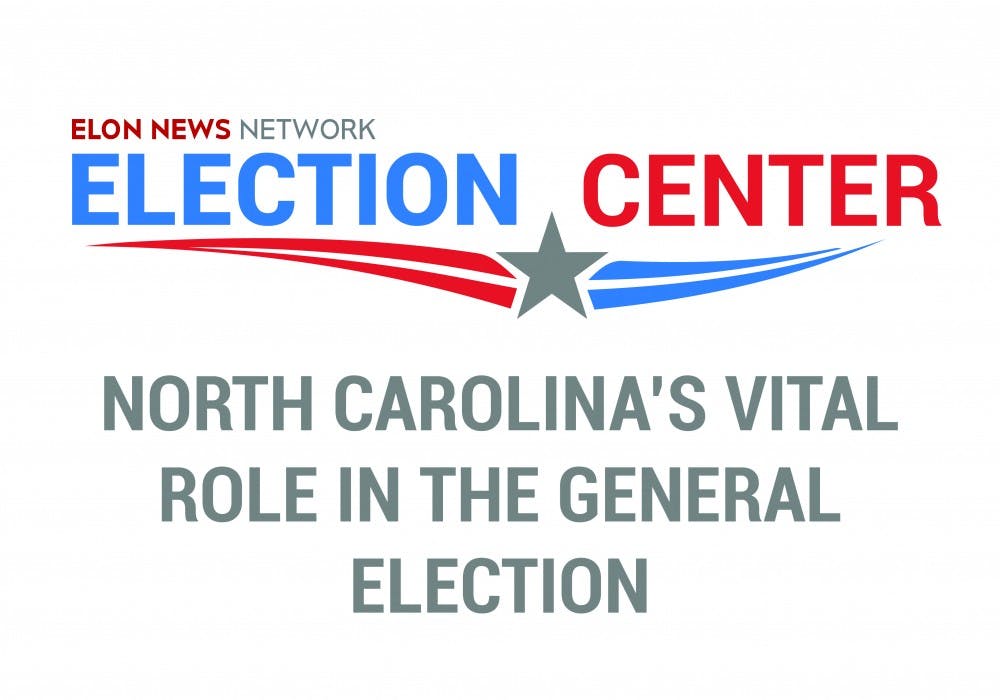This piece appeared in the Nov. 2 Election Special Edition. View more from that edition.
North Carolina’s 15 Electoral College votes may seem trivial compared to the 270 total needed to win the United States presidency, but the votes placed in the state Nov. 8 will have a significant impact in deciding the next Commander-in-Chief.
Since July, campaigns for both Democratic presidential nominee Hillary Clinton and Republican nominee Donald Trump have reflected the state’s high value, as each has made regular appearances. Clinton has even sent surrogates, including President Barack Obama, First Lady Michelle Obama and former President Bill Clinton, to energize voters.
North Carolina has historically voted Republican, but Barack Obama ended that nearly 32-year trend when he won North Carolina in 2008. Current polls show that the state is an active and fluid battleground, with the two major party candidates ranging within a 2-to 8-percent difference of each other. The latest Elon Poll shows Clinton edging Trump by 1.2 percent.
“The road to the White House runs through North Carolina,” said North Carolina Democratic Chairwoman Patsy Keever at a July rally with Clinton and Obama.
National spotlight has shifted to North Carolina over a myriad of issues this year, many of which outline some of the biggest problems facing the United States as a whole.
Race debate invades Charlotte
The September police shooting of Keith Lamont Scott in Charlotte drew responses from both candidates, and each of them visited the city in the weeks following the tragedy.Protests ravaged Charlotte for three days after the shooting and at a press conference in Pittsburgh Sept. 22, Trump voiced his displeasure at the country’s current situation regarding race relations.
Trump dubbed himself the “law and order” candidate during his nomination acceptance speech at the Republican National Convention in July, so his response to the Charlotte shooting fell in line with the way he said civilians and police should not interact with each other.
“Our job is not to make life more comfortable for the violent disruptor, but to make life more comfortable for the African-American parent trying to raise their kids in peace,” Trump said, according to the Los Angeles Times. “We need a national anti-crime agenda to make our cities safe again. Our country looks bad to the world, especially when we are supposed to be the world’s leader. How can we lead when we can’t even control our own cities?”
Clinton also remarked on the situation in Charlotte during her Oct. 2 visit to Charlotte about the need for reform regarding the criminal justice system.
“I’m a grandmother, and like every grandmother, I worry about the safety and security of my grandchildren,” Clinton said, according to NBC News. “But my worries are not the same as black grandmothers.”
She added that every child, regardless of race, “deserves the same sense of security” and “deserves the same hope.”
HB2 and LGBTQIA rights
Video produced by Tommy Hamzik
Conversation around another issue—LGBTQIA rights— has also illuminated North Carolina’s importance. The issue was brought into national conversation when North Carolina by Gov. Pat McCrory signed House Bill 2 into law in March. HB2, also known as the “bathroom bill,” struck down a Charlotte ordinance and required transgender people to use the bathroom corresponding to the gender listed on their birth certificates.
Clinton condemned the bill at a September rally in Greensboro, visiting days after the ACC removed championship sites from the city because of the law.
“I’m running for the LGBT teenager here in North Carolina who sees your governor sign a bill legalizing discrimination,” Clinton said.
Originally, Trump did not support HB2, but he realigned himself with the law and has endorsed McCrory for reelection and frequently campaigns with him.
In a broader context, LGBTQIA rights have divided the GOP for years. The party’s platform, passed before the 2016 convention, states “The cornerstone of the family is natural marriage, the union of one man and one woman.” Yet Trump attempted to garner more votes from LGBTQIA individuals in his nomination acceptance speech.
“As your president, I will do everything in my power to protect our LGBTQ citizens from the violence and oppression of a hateful foreign ideology,” Trump said, largely to applause. “And I have to say, as a Republican, it is so nice to hear you cheering for what I just said.”
Vital for Trump to win North Carolina
Video produced by Paul LeBlanc
In most cases, experts predict that North Carolina is more important to Trump than Clinton. According to The Upshot, a prediction website powered by The New York Times, it’s impossible for Trump to win the general election without winning North Carolina. The Upshot also said if Clinton were to lose the state, she still would have other viable options to win. But even so, Clinton keeps investing time and effort into the state, which reveals how desperately both candidates want to claim North Carolina on Election Day. Michelle Obama urged this with North Carolina State University students in October when she said, " No matter who you are, understand your vote matters." Trump, desperate maintain North Carolina, has also said the same thing. He also said in Wilmington inJuly that North Carolinians should get used to seeing him.
I'm going to be in North Carolina so much, you're going to be sick and tired of me," Trump said.



